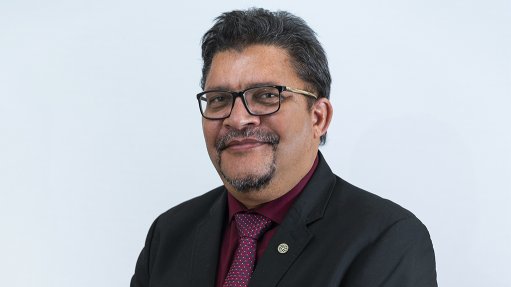
CHRIS CAMPBELL A more focused conversation specific to infrastructure development is needed
While upcoming project-orientated economic activity is expected to translate into a yearly demand of 2.3-million new project managers, Consulting Engineers South Africa (Cesa) CEO Chris Campbell urges a more focused conversation specific to infrastructure development, and “not generic project management”.
This “generic perspective”, he explains, has led to projects not being adequately managed, which can often be seen in State-owned enterprises embarking on the “simplest” of infrastructure projects, recruiting people with “all kinds of project management credentials and certifications” but with no specific infrastructure-specific knowledge and experience.
Needless to say, the results are often “disastrous”, and it is therefore imperative that persons pursuing project management as an area of specialisation be equally knowledgeable in the specific applications, Campbell comments.
He explains that a basic qualification in a built environment field of study (such as engineering, quantity surveying, architecture or construction or building sciences), followed by some level of experience in the application of such tertiary studies, “is essentially what would be required for a competent infrastructure project manager”.
Campbell highlights the importance of remaining mindful that whereas there may be a low number of people pursuing a qualification from the Project Management Institute (PMI), for example, “there are many more practitioners who have, through experience and other studies, become competent project managers themselves as an additional skill to their previous ‘technical’ specific competencies”.
“We need to use all of the resources we have available while contributing to building the feedstock of practitioners for the future.”
In this regard, Cesa created a database of unemployed engineering practitioners about four years ago. Over 400 qualified persons in the database remain unemployed, owing to the slow roll-out of strategic infrastructure projects in South Africa.
“I would certainly want to segment that demand of 2.3-million project managers per year to be more industry specific as the sectors of our economy are not always in sync with each other, and a shortage in one period of a sector’s cycle could mean a surplus in the cycle of another sector, although this should not be seen as an automatic opportunity for “plugging” of the gap if the specific experience in infrastructure is absent or lacking,” Campbell says.
He adds that, while the body of knowledge regarding project management processes may be the same, if not accompanied with specific contextual experience, it “could mean that one has a host of project managers unemployed because they lack the specific industry knowledge within which their project management skills would need to be applied”.
Cesa has, therefore, been mindful of the specific expertise required and, to this end, hosts a series of courses on project management, including the ones required for the project management professional (PMP) certification through its School of Consulting Engineering.
This is often complementary to their existing bodies of knowledge and skills as practitioners in a consulting engineering environment.
Covid-19
The PMI, meanwhile, previously highlighted that organisational agility will need to be built into upcoming projects, something with which Campbell agrees, stating that “for any business to survive, organisational agility is key”.
The Covid-19 pandemic, for example, saw project managers and consulting engineers, among others, having to embrace the solutions that technologies offered in hosting project meetings online.
Information exchange between engineering consultants and contractors, though already digital, became even more imperative when contractors were allowed to restart on-site working after the hard lockdown, but consultants’ offices were not always open for project-specific design meetings and these had to be conducted online with design teams involved in such projects to ensure coordination, especially on multidisciplinary engineering aspects of an infrastructure project, Campbell elaborates.
He comments that “engineering consulting companies had to adapt quickly to the changed environment, as an inability to meet deadlines, such that project implementation would have been delayed and costs increased, would have resulted in claims against such companies”.
Campbell explains that it therefore becomes even more imperative that, in considering the “agility” discussion, companies invest more proactively in technologies that can add to their efficiencies, so that they are better able to adapt their working models to different operating environments.